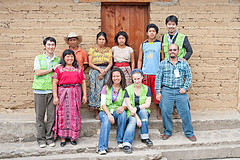Pamela Ribon's Blog: the latest from pamie.com, page 13
February 3, 2011
Purr Your Request
I'm not helping this "Crazy Cat Lady" thing any with this, but in my defense: you guys specifically asked for it.
Yesterday I posted a tweet at one point saying that you guys were lucky I have restraint and don't make old-timey videos with my cat who lets me put him in various outfits. Immediately, you guys were like: "Please post immediately."
So this is what I did. Many thanks to Cal, who is patient, even though you can tell he'd like me to go be busy doing something else.
January 6, 2011
Pictures of Cats and Sunsets
I've had a few deadlines in a row lately, which makes me neglect this space. I feel guilty about it, I promise you. I've had "Write up the Orient Express stories" on my to-do list since we got back... was that September? Anyway, I find that when I'm inspired to jot something quickly over here, it's usually just short enough for a tweet, or so long that if I write it over here I won't be working on what I'm supposed to be working on script/pitch/outline/novel-wise.
Truly, if I actually posted the things I almost post during a day, this site would be composed entirely of pictures of cats and sunsets. Which is exactly what my Tumblr looks like.
I don't know that I had a chance to announce over here that I am working on a new novel. I use the word "announce" because it's going to be published. I am not announcing the other things I've turned in to my various agents coast-to-coast because they are "projects" that are in the "works." But the novel will actually one day be tangible... just as soon as I tangigate it. Titles and publishing dates and all that fun stuff I'll give you later. Suspense!
As I use this little square here to stall on the "project" I'm "working on" (screenplay, halfway finished, currently killing me. first drafts are hell.), I am proving to myself that I do actually get in my own way sometimes. I can see the finish line of this project. It is outlined and notecarded and scribbled and I've used sixteen different ways to write about it while technically procrastinating writing it. But I'm stuck on a "cut to." I don't know why I will do just about anything other than write the next scene. Cut to: me washing dishes. Cut to: me taking pictures of my cat. Cut to: me signing up for Tumblr. Cut to: me super frustrated with myself, wondering why I can't just keep writing until I reach "Fade Out."
I think it's the lack of official deadline on this one. I turn stuff in when I have people holding me accountable. But when I'm making a piece of material on spec, it's way more interesting to find out what's new on Netflix streaming, or jump around in front of the Kinect for, well -- you guys, sometimes five hours will have gone by. It's ridiculous.
I use the novel, which has an actual deadline, to force the non-deadlined screenplay to have a deadline.
OH, GOD. WHAT AM I DOING? You can't possibly care about this. I barely care about this. I think I started writing this because over the holidays, meeting all kinds of people, the number one thing they said to me when they learned I was a writer was, "You must be very disciplined. I can't imagine doing that every day."
I usually joke that all it takes is the ability to sit still, which most people can do, but then I look over this "to-do" list that's technically a "to-keep-from-writing" list and I think: there's no discipline. I'm just afraid of getting a C on a paper. That's it. That's my secret. I'm still scared of making a C.
Rewards don't really work for me. I won't finish this script if I tell myself I can buy myself something pretty, or have a celebratory meal at Jar. I won't get it done with the promise of a spa day or a bag of Doritos. The only thing that will get me to "Fade Out" is a deadline and someone who's supposed to read it and tell me whether or not it's good. And until I hear feedback, it feels like talking into a closet.
Anyway.
Cal, from my couch:

Paris, from the top of Tour Montparnasse:
Sorry about the neglect, pamie.com. I hope it means lots of projects turning into announcements in the future.
December 14, 2010
Project Cookstoves Video
I know you're like, "Look, Pamie. Your essays were great. But when do I get to see you in Guatemala trying to be all Anderson Cooper, but eventually just having to use your inhaler?"
By the way, I made a $400 donation to Project Cookstoves for one cookstove on behalf of pamie.com. If you feel like spreading some holiday cheer their way, any little bit helps.
I want to thank those of you who have already donated to the project. They send me names, and I recognize a lot of generous pamie.com people on their lists. You guys are the coolest, time and time again. Thanks and happy holidays.
(Here's the video embedded, but it's too wide for the column and I am so frustrated with movable type and my ancient website that hasn't had an update in over four years. I mean, it's pathetic. 2011-- I had better figure out a way to get this site in gear. Anyway: please click the link above to go to the YouTube page for the video.)
November 25, 2010
It's Not That Scary: The Guatemala Stories (Round Up)
Here's the place to get all of the links for the five-part essay on my recent trip to Guatemala.
Part One -- Getting to Solola
Part Two -- Faceplants and Toilets
Part Three -- "A Different Kind of Gringa"
Part Four -- There Will Be Blood, and It Will Be Weird
Part Five -- All Smiles
Good Neighbors Project Cookstove
It can be said that most of us take our kitchens for granted.
We think of the kitchen as a gathering place, the room where our families start and end each day. This is where stories are swapped, homework is scribbled, meals are cooked, bread is broken, secrets shared– our lives unfold inside our kitchens, each and every day.
It is the center of our homes, the heartbeat of our families. It nourishes us. It comforts us. It's even there in the middle of the night when we can't sleep.
But what if the kitchen was where you sleep? And where your children sleep. And what if – instead of the safe, traditional range oven you're accustomed to – you cooked your meals over an open flame? What if your stove was nothing more than a pile of firewood, and beside that rising smoke and ash was where you kept your baby's cradle?
For the families nestled among volcanoes in the villages of Solola, Guatemala, in the hills jutting high above stunning Lake Atitlán, this is the reality of everyday life.
The most basic of our camping necessities -- a pile of burning firewood – is their traditional form of cooking. It needs constant attention in order to keep its flames fed. These fires must burn all day and through night because it isn't just a stove, this is how families keep warm at night when the temperatures plummet. It's not uncommon for families of eight or more to share a twelve by twelve room -- their entire living space -- piled together five to a bed, their only source of heat an open fire near their faces, the only ventilation a few inches of space in a corner between the walls and the ceiling.
Imagine being trapped inside a house fire in your bedroom, every single night. This is every day for over an estimated three billion people throughout the world.
The World Health Organization estimates 1.9 million premature deaths a year can be attributed to daily exposure to harmful smoke from cooking fires – the fourth worst overall health risk factor in developing countries. Exposure to this smoke causes low birth weight, pneumonia, emphysema, cataracts, lung cancer, asthma, bronchitis, and cardiovascular disease. Women and children are the most affected, as they spend their days inside the confines of their home, inches away from a steady stream of carbon monoxide, not to mention the constant risk of fire damage.
But this isn't just a health issue.
Keeping their traditional stoves burning requires daily trips to the forest – often a two-hour trek each way. This massive daily requirement for over five million families accelerates deforestation, straining the planet's natural resources, contributing to climate change. The smoke rising from the homes thickens the air black with soot and ash.
But this isn't just an environmental issue.
This is how you get six-year olds holding machetes instead of schoolbooks. The women and children who gather this firewood put themselves in mortal danger. It isn't hard to imagine the tragedies that unfold every day. Teenage girls are brutally attacked and assaulted. Young boys fall from trees, suffer injuries from carrying massive amounts of stacked wood on their backs and heads, or cause irreparable bodily harm from wielding those machetes. Unfortunately, everyone in Solola has a story. They all wish it could be different.
There wasn't much of a choice. Until now.
"Today we can finally envision a future in which open fires and dirty stoves are replaced by clean, efficient and affordable stoves and fuels all over the world," Secretary of State Hillary Rodham Clinton stated as she recently announced the Global Alliance for Clean Cookstoves. "By upgrading these dirty stoves, millions of lives could be saved and improved. Clean stoves could be as transformative as bed nets or vaccines."
Good Neighbors USA is proud and excited to be partnering with Good Neighbors Guatemala on a three-year campaign to replace traditional "dirty stoves" in Solola, with safer, energy efficient, life-changing cookstoves. The new cookstove drastically reduces toxic emissions and cuts the need for firewood by more than half. The cookstove's improved design takes the cultural needs of the families of Solola into account, functioning as a stove, an oven, a furnace, and – because of the tiled edges that are cool to the touch even when the stove is in use – a table. It creates the safe, warm kitchen environment so many of us associate with healthy, happy families.
This means cleaner airspace. This means more trees survive. This means children have time to go to school. This means women are safer, and more empowered.
Good Neighbors hopes to install one thousand cookstoves a year over the next three years to deserving families in Solola. But they need your help. For just $400 USD, you can sponsor a family, providing the installation of a brand-new, energy efficient cookstove that will save lives. For more information, or to start helping immediately, go to here (more information will be added to that link November 29th) or please contact Good Neighbors at gnusa@gnusa.org.
Working with Good Neighbors, you have the power to change a crisis into a kitchen.
----
Good Neighbors International (GNI) is an international humanitarian and development non-governmental organization in General Consultative Status with the United Nations Economic and Social Council (ECOSOC). GNI strives to improve lives, especially children's lives, through education, food, shelter, community development, medical care, advocacy and emergency relief. GNI has made great strides in its mission by providing people around the world with a better quality of life since its establishment in 1991.
It's Not That Scary: The Guatemala Stories (Part Five)
We spent our last two nights at Senor Robin's, the only high-rise apartment I know where the roosters still wake you at four in the morning. The second to the last day we went out to visit a school in a breathtakingly beautiful place called Patzicia, where we hung out with the kids during recess and I was reminded once again that I really don't know enough Spanish.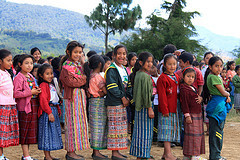
We also visited a family who'd had a new cookstove for about a month. The difference in their living conditions was immediately noticeable. No heavy clouds of smoke and ash. No feeling of walking into a house fire. Instead, the family was gathered around the cookstove, sitting and talking, making tortillas. Nearby, the children sat around a crate fashioned as a kid's table. Here the family could gather in a kitchen, have lunch together and tell us about their hopes and dreams for their children's futures. "I teach the boys farming now," the father told us, "Because they are seven and need to know, just in case. But I make sure they go to school. I know there's something else out there for them. I teach them farming in the afternoon to be a responsible father, but I make sure they do their homework, because that's giving them a future."
We spent the last two nights in Guatemala City eating enough food to make up for any possible missed meal over the past few days. Our first night we were treated to Korean food (and another kidnapping story), and I was escorted in a bulletproof Lexus.
"Pam," Robin said as we drove home that night. "What is left inside your Mom bag that we have not used?"
"Just a couple of--
glow sticks.
"They'll get used," she said. "Maybe for my birthday."
Our last day in Guatemala City was also Senorita Robin's birthday, so we threw her a surprise party. She didn't know I was already planning on using those glow sticks for that very purpose. During the thirteen seconds we were in Antigua, both Nikki and I discovered that we had each secretly wandered off to find presents for Robin. I used my remaining
toilet seat covers
to wrap her gift. We gathered together for so much food, swapped stories about sunburns and roosters, and periodically checked on the still-ailing Senor Robin. It couldn't be a late night, as we had to get up at 4:00am to catch our flight home, so the goodbyes were brief but sweet. It felt strange knowing I wouldn't see Nikki first thing in the morning, that there would be no more brick-soaking chatter with Hugo, that in a few hours I'd be back in my own bed, near a toilet that has flushable toilet paper.
I donated my
poncho and emergency backup poncho
to the Good Neighbors Guatemala office.
And that's my backpack. The only thing I didn't end up using the entire trip, despite how many times people told me I was definitely going to need it:
Immodium
I'm very happy about that.
I'm posting these stories on Thanksgiving, because this is the time we think about how fortunate we are, and how grateful we are for our families, our friends, and our health. We make promises to help others who are less fortunate, we think about donating our time and our money to people who are in need. It's much easier to get caught up in our own lives, the things that are hard, the stuff that sucks, frantic when our DVR's malfunction and we miss an episode of our favorite television show. So I'm writing this today to remind you that traveling is not that scary, that meeting people is fun, and helping people – even in the smallest way – makes you feel more connected to this world than you could ever imagine.
Happy Thanksgiving, everybody.
To see lots and lots of pictures from the trip, go here. To start from the beginning, go here, or to find out more information on Project Cookstove, go here.
It's Not That Scary: The Guatemala Stories (Part Four)
tampons/pamprin
I really wrote all of that stuff before so I could tell you this, my favorite story from the trip.
Okay, look. We've been through a lot together, you guys. So here is where I tell you that I was two hours into the road trip to Solola, at a gas station in the middle of nowhere, in a caravan where I still hadn't learned everybody's name, when I got my period.
THIS IS THE WORST THING EVER.
There were times on this trip where you really didn't see anything that could be considered a bathroom and not an outhouse or a hole for like, eight hours. There were things I needed to attend to, and I really didn't want to leave that many reminders of my trip behind. "Well, I spent three hours trekking to the forest for firewood, and then I spent about five hours making tortillas for my family, and then right before I went to bed I found some American lady's used tampon wadded up and half-hidden in my outhouse. So, no, I don't know if you'd call today a success."
At one point I was thinking, "You know, I'd have kids of like five or eight, too, if it meant not dealing with tampons and hand sanitizers and a number of the nasty personal moments I've had this week."
I waited a couple of days and halfway between a two-hour car ride before I finally had to mention to someone that I was in need of some kind of real bathroom at least for thirty seconds. I told Nikki.
"I mean, I feel like I'm all The Red Tent here, but I don't know what else to do."
Nikki asked what The Red Tent is, and since I've never read it I ended up babbling what I thought it was about, which it wasn't (I didn't know it was fiction, for starters), but I knew enough to say that menstruating women were sent to this Red Tent until they were done.
"That is crazy!" Nikki said, because I had told her that this was, in fact, true. "Why would you do something like that?"
"I don't know. People have weird customs when it comes to blood."
"Well, we don't," Nikki says. "I mean, you can't be in the kitchen when I'm making cookies, but everybody knows that."
There's a silence for a little while before I go, "What?"
Nikki gives me a very patient look. "You know. How you'll ruin the mix."
"I'm sorry?"
"With your menstruation. Your sight. Because it is so powerful." Here she sighs, like I should already know this. "How if you look at the mix it will be ruined."
I do believe this is the first time I ever cursed around Nikki, when I said, "Get the fuck out of here."
"Pam. It is true!"
"I will ruin your cookies?"
"Or my cakes or pies. Anything you bake that has to be mixed. Maybe not bread. And it's only during the mixing time. My mother will ask me and my sister before she makes cookies. 'Are any of you menstruating?' And if so, we have to leave until she's done mixing. Pam, stop looking at me like that. It is true."
"What happens to the mix?"
"It is ruined. It just is. You can taste it. It is ruined!"
"…because of yeast?"
"I don't know what you mean."
"Me either! I'm trying to figure this out! What if I promise not to look at you while you are mixing the ingredients?"
"Now you are making jokes."
"I'm not!"
"It's real, Pam. Even I can't make cookies if I'm menstruating. Someone else has to do the mixing for me."
"This is amazing. What if the girl making the cookies is blind? And she can't see the mix? Is it still ruined?"
"See, you are making jokes."
"I'm not! I wish I could tell you we did something equally weird in the states, but we mostly just make fun of each other."
I can't find anything about this on the Internet. Back at the hotel, I told Robin about this, and asked her if the Koreans had any bizarre customs when it came to being on your period.
"No," she deadpanned. "And I think you are being racist for asking. That is crazy, that they can't make cookies."
"I'm not being racist! I figured if anything the Koreans would have a good custom."
"Racist!"
So this died down until a couple of days later when the other Robin – a boy whose English/American name is Robin (which delighted everybody both Korean and Guatemalan when they learned that boys and girls can be named "Robin"), which made him eventually get called "Senor Robin" by everyone – came down with food poisoning or something. All I know is I thought he was falling asleep on the road, and then he quietly pulled over and yakked behind a gas station.
This caused much shifting of driving responsibilities, as we still had a long way to go to get back to Senor Robin's place in Guatemala City, and I ended up in a car with Robin, Jeff and Senor Robin, who was trying to hold it together in the front seat. I passed up one of my
Emergency Plastic Bags
in case he was feeling sick on the road. Everybody was discussing in Korean what to do about how Senor Robin felt. Then Jeff, who was driving, was talking about something, using my name, and miming something like scribbling with a pen. I wondered if they were discussing whether or not I was going to write about this, when Jeff asks, in English, "Pam, do you still have your sewing kit?"
Sewing kit, part two
"Why? What's wrong? Are you making fun of me?"
"No, we need it to make Senor Robin feel better."
"How so?"
Robin turns to me. "We need to make him bleed so that he won't be sick to his stomach anymore."
And then I cursed for the first time in front of Senor Robin and Jeff when I said, "Get the fuck out of here."
"We have to prick him, right along the cuticles, and then when the blood drains all the bad stuff will be out of his system."
"Who will?"
"You will, I guess. You still have those sterilization wipes, yes? And a needle?"
"Oh, my God. We are in a moving vehicle!"
"This is what will make him feel better. My grandmother used to do it. It works."
"How does it work?"
"Well, you know how you don't feel good sometimes, because you have food trapped in your arm?"
"NO, I DON'T KNOW. BECAUSE OF X-RAYS. You realize you don't get to say another word about Nikki's cookies, right?"
"Senor Robin is sick."
"Okay. I'm getting the sewing kit. But can we videotape it?"
"Hand me your camera."
Senor Robin didn't feel better five minutes later. But it did make me wish I knew Korean. When we got back to Senor Robin's apartment later that night (after taking Senorita Robin on a confusing trip to the mall to distract her while everybody else was making her surprise birthday party for our last night in Guatemala), Senor Robin held up his hands to show seven bandaged fingertips.
I started telling my Korean derby friend Risky A Go-Go about this, and she interrupted to go, "Did you make him bleed? Yes, my grandmother used to do that to my cousins all the time when they had stomach aches."
(This, by the way, I did find on the Internet.)
I know I learned an awful lot about cookstoves and a very real health crisis requiring the need for sponsoring families in Solola. I saw extremely difficult conditions where people lived, I watched children carrying stacks of firewood on their backs, women holding machetes for both work and protection, and heard horror stories about children dying in tragic accidents that come from the need to gather this wood. And I know I've been asked to write all about this situation, to help get much-needed attention to the families of Solola. The thing is, this is the best story from the entire trip, and I really wrote all that other stuff just so I could tell you the menstrual-cookies-and-bloodletting story.
So if you liked it, please think about sending a few dollars to Good Neighbors. If anything so that I can keep going on these trips and report back to you about blood-related customs in other parts of the world.
(Part five continues over here.)
It's Not That Scary: The Guatemala Stories (Part Three)
baseball cap/ bandanas / combat boots
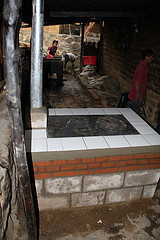 Despite my fall, I was dressed rather appropriately for the amount of hiking and manual labor that was ahead of us. At one point we were met by one of the Good Neighbors Guatemala staff, a tiny Korean girl named Genesis, who was in skinny jeans, a scarf, boots with heels, and other fancy clothes. I admired her ability to dart around the dirt floors, carry cinder blocks, and take down notes in ball point pen on the palm of her hand so that she can help with a future installation of a cookstove.
Despite my fall, I was dressed rather appropriately for the amount of hiking and manual labor that was ahead of us. At one point we were met by one of the Good Neighbors Guatemala staff, a tiny Korean girl named Genesis, who was in skinny jeans, a scarf, boots with heels, and other fancy clothes. I admired her ability to dart around the dirt floors, carry cinder blocks, and take down notes in ball point pen on the palm of her hand so that she can help with a future installation of a cookstove.
Later, in the car, I said to Nikki, "She's wearing what everybody thought I'd wear here."
"What?" Nikki said. "You wear clothes like this?"
"I would normally be in a skirt, Nikki. I had to buy pants for this trip. I don't dress like this normally."
"You? You wear a skirt? The girl who's wearing all the bandanas?"
Like I'm Punky Brewster. But I did have a bandana on my head (to protect from sunburn) and one around my wrist (treated with bug repellant), and my paint-splattered jeans were thick with mud (…from the fall). She had a point.
"I normally try to dress a bit better than this. I have a skirt packed, just in case."
She shook her head, impressed. "You, Pam, are a different kind of gringa."
"How is that?"
"The Americans who come here," she says. "We talk about them, how they dress. You have so many places to buy clothes. We talk about how we'd wear always nice clothes if we could buy them that easily. I wish we had an Old Navy."
And it's true, the only women I saw wearing grubby clothes were foreigners. San Pedro La Laguna, where we stayed, is rather overrun by expat hippies. So many dreadlocks on white ladies. So many. One of the kids we visited asked me if I was from Antigua, which is one of the more touristy areas of Guatemala. I told him I lived in Los Angeles, California. "Canadian?" he asked me, and one of the other little girls told him I was from the United States. He gave me this look like, "Whatever. You're totally from Germany."
But I told Nikki, "Those Americans who are traveling in shorts and t-shirts, you know that's because they're in travel mode, right? They're hiking and running around and it's dusty and maybe they are staying in a hostel or whatever."
"I guess."
"And they tell us to come here without any jewelry, and to leave all of our nice things at home."
"Mmm-hmm."
"And also, what if my luggage gets lost? Do you know that my bag was unzipped when it came off the plane? I saw luggage that was just like, a Forever 21 bag with a string tied around it." (THIS IS TRUE.)
"I guess I can understand. But I have a hard time imagining you in a skirt right now."
iphone / camera /handheld camera/ notebook
I took a bajillion pictures and videos, but the notebook came in handy almost immediately when I learned on the first day I was going to interview the mayor for the video Good Neighbors is putting together for Project Cookstove.
(This reminds me of one thing I did learn about traveling with almost exclusively Koreans. Exaggeration does not work with them. I'd say something like, "I have about a hundred bug bites on my arm," and someone would gasp and say, "Oh no! One hundred! That is so many, let me see! Do you have medicine for them? Can I help with something?" Then I felt like a jerk, so I'd have to be like, "It's only four. I'm okay. Sorry to worry you.")
Anyway, I interviewed the mayor, and the awesome lady who runs the women's center, and due to my apparently fantastic looking-like-I-understand-Spanish skills, I was soon asked to teach a seminar.
A SEMINAR.
So it's a good thing I'd packed that skirt.
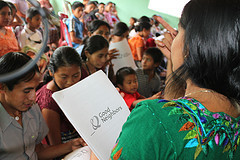 "Maybe twenty women or so will be there," they said. "Do not worry. You will just tell them about Good Neighbors and Project Cookstove, and you will explain how this cookstove will improve their lives, and how it works, and then how to sign up to be considered for sponsorship."
"Maybe twenty women or so will be there," they said. "Do not worry. You will just tell them about Good Neighbors and Project Cookstove, and you will explain how this cookstove will improve their lives, and how it works, and then how to sign up to be considered for sponsorship."
You guys. Hundreds of people were there. Families. Lots and lots of people. Luckily I wasn't the only one to speak, nor was I the one they were coming to hear. Everybody loves the mayor, and the women who run the women's center are such amazing public speakers even I was like, "Yes, Ma'am, whatever you say. But you'll have to tell me what you said in English and then I'll do it. Right away."
I, however, looked like I was telling them that I had come to steal every one of their children. Right after I finished singing some song I wrote about Solola. Which is why, even though I had packed with me--
Kindle – Learn Spanish in 12 Days
--It was pretty much useless. I was most helpful, I think, when I was painting a cookstove next to a chicken.
Instant Starbucks Coffee
I take it back. My biggest regret on this trip is that I TOTALLY FORGOT I HAD THIS IN MY SUITCASE. Because I don't care how much it might make me look like a wuss traveler, Nescafe is not coffee, it's nothing close to coffee, and it's not a substitute for coffee. It makes me start every morning with anger.
Luckily my companions were also coffee drinkers, which is how I learned to love the completely foreign concept to Americans that when you go for coffee, you get espresso, you sit down and drink it, and then you move on. I started learning the importance of it in Venice and Paris with my mom back in September, but I didn't fully appreciate why someone would want to walk around without a paper cup of latte in their hands until this trip. Every sip of Nescafe was sad, and I am kicking myself that I forgot this little emergency present I had packed, from LA Pam to Guatemala Pam.
It was in my suitcase!! The whole time!! Aaaaugh!!!
trail mix / granola bars
Long, long car rides, and only one day did we forget, as second car, to pull provisions from the first car. That's the day I passed out my emergency supplies. I think it's also the same day I shot this footage of driving through San Pablo La Laguna.
While I was shooting this, the other people in the car were discussing the name of the town.
Bryan: What is does "La Laguna" mean, Nikki?
Nikki: It's a body of water, kind of… I'm not sure how you'd call it. Not like a pond, but part of the lake that kind of… Pam, how would you say that word in English? "La Laguna"?
Pam: Well... and I am only guessing here, but I think it's "lagoon."
Nikki/Bryan: Oh, right, yeah!
It was pretty much the only time anybody ever needed a word in English, but at least it made them all laugh.
( For part four, go here.)
It's Not That Scary: The Guatemala Stories (Part Two)
iPhone / Camera / Video Camera
People who know me at all right now are probably asking themselves, "Okay, fine, Pamie. You went to Guatemala. Now skip to the part where you fall."
First of all, how dare you.
Secondly, it's right here.
The best part, other than the fall, is how you can hear how nervous I was to use even a single word of Spanish. This was the very first time we'd ventured out to see a family. At this point I'd already interviewed the mayor on camera, so you think I'd feel a little less stressed out, but no. I was pretty nervous and feeling like – I don't know – like we were a bunch of people descending on this tiny little shack-house in the middle of a village in the middle of nowhere… which is kind of what we were.
So anyway, I fell, and my biggest regret of the entire trip is that I panicked with shame and instantly turned off the camera, missing the next few seconds, which were the best. Immediately, everybody turned and said, "Cuidado! Cuidado!" I already knew the word for "careful" in Spanish, because I am a klutz. So I started going, "Esta bien! Esta bien!" and then they were all laughing at me. Jeff turned around and said, "You got up SO FAST. I heard you fall, I turned around and you were already up!"
And I said, "Roller derby."
You guys! I fell and got back up! May Q. Holla is back!
(For those of you who are like, "Why does what Jeff said to you sound so familiar?" Right here.)
A few days later when we were getting into the back of one of the cars, Bryan shows me how he has his knee in a brace. "It's not roller derby, but I'm also hurt here." This was like, the third busted-knee story of the week, the other two sporting Tae Kwon Do injuries. "What happened?" I asked him. Like he was giving me directions to the gas station he was all, "I was in Pakistan when our car was hit by robbers who knew I had just gone to the bank. I was thrown from the car and landed on this knee. But roller derby, that sounds dangerous."
I was traveling with super polite badasses.
Dramamine
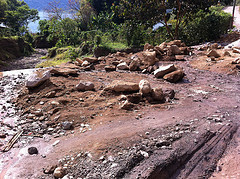 I'm not someone who normally takes five-hour car rides to go help people in poverty, so I knew I was going to need motion sickness meds. But I didn't need to be embarrassed – I ended up dishing these things out like Pez. Everybody was getting sick on this trip. The roads are not really roads and the chicken buses are huge and scary and people drive like there's a winner at the end of the day for Most Reckless. We also had to take the longer, alternate road to San Pedro, since the main road to Panajachel was closed for repair and, you know, all the banditos I'd mentioned earlier. Each day had at least two hours in the car. But more on being sick in cars later.
I'm not someone who normally takes five-hour car rides to go help people in poverty, so I knew I was going to need motion sickness meds. But I didn't need to be embarrassed – I ended up dishing these things out like Pez. Everybody was getting sick on this trip. The roads are not really roads and the chicken buses are huge and scary and people drive like there's a winner at the end of the day for Most Reckless. We also had to take the longer, alternate road to San Pedro, since the main road to Panajachel was closed for repair and, you know, all the banditos I'd mentioned earlier. Each day had at least two hours in the car. But more on being sick in cars later.
blanket and pillow from the airplane
Swiping these items might have been the smartest thing I did. Because, oh –
flashlight
--the second meeting in Los Angeles began with an instruction guide on how to check for bedbugs, which we did as soon as we finally, finally got to our hotel in San Pedro, a full twenty-bajillion hours after I left my apartment in Los Angeles. No bedbugs, but the pillow smelled like someone else's face. My own blanket and pillow, both made for someone about two feet tall, were my best friends at night.
Tiny bottle of Tito's Handmade Vodka / corkscrew
Other than this, my true best friend at night.
The corkscrew was for Robin, just in case she forgot one. At the end of our bedbugs meeting she had looked across the table at me and asked, "Do you drink?"
I couldn't tell what the right answer was, so I just said the truth. "Yes."
"Oh, good." She said. "Because they don't. Not at all. It is annoying."
Annoying, mostly, because we knew as two girls we weren't going to get to go out alone at night in Guatemala, and we knew the chances were two married guys who don't drink aren't going to take two ladies who want to drink into a Guatemalan bar. So we each brought contraband. I didn't need to worry about the corkscrew: Robin had accidentally packed two. I was very grateful to have Robin on this trip. She was way better than Tito's Handmade Vodka, which again was a very good friend to have on the trip. We were rooming with extremely sweet Nikki, who -- while ending up being a very good friend -- wasn't much of a drinker. Robin and I had to get creative. Which we did. But by our final night in Solola, when we ate dinner on the edge of Lake Atitlan, I'm pretty sure I saw everyone take at least one sip of beer.
Anyway, discussing my friends of Guatemala leads me to my Guatemalan enemy: Toilets.
baby wipes/tissues/hand sanitizer
Which one of you tweeted me that I will want to bring a container of baby wipes with me? Because you are the best thing that ever happened to my Twitter feed. Everybody in my group thanks you, even if they don't know they were supposed to. By the third day Robin started calling me "Mom," as in, "If you need something, Mom probably has it in her backpack."
sunscreen/itch spray / bite salve / DEET
I would load my backpack with extra emergency items, because everybody else was getting bitten, swelling with welts (sometimes on their faces!), red-cheeked and chapped, needing to find a way to squat over child-sized toilet-seats in outhouses (DO YOU HAVE ANY IDEA HOW IMPOSSIBLE THAT IS?!).
Here's a little video I call "Donde esta el bano?" because that's what I asked before I was just… following some people (I would later get to know, but at the time they appeared to be complete strangers), not knowing where I was, what was happening, or if it was a good idea to walk so far away from where the car had stopped for what I thought was picking up some water or something. I just know that it started with pigs screaming as they were being bagged and tied to truck beds.
Look, I'm not one to discuss bathroom stuff, but the only thing that kind of sucks about traveling is that you end up experiencing some seriously sketchy bathrooms. And that's never any fun.
Bottled water/toothpaste/face soap/Visine
Nor is it any fun when you aren't supposed to drink the water, put it in your mouth, or put it near your eyes. (Cut back to Tito's Handmade Vodka, which I used one night to brush my teeth. I'M A BADASS.)
bandaids/super antibacterial wipes (Hibistat)
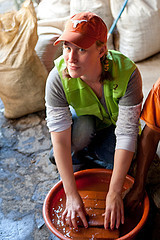 I was about an hour or two into helping install a cookstove (I was soaking bricks to prep them) when I saw that I had cut open a burn on my hand and had been soaking it in well water. I immediately headed to the backpack, where I poured hand sanitizer into the open wound, then used these Hibistat wipes to burn off pretty much all my skin, and then bandaged myself up. People were giving me "concerned" looks, but I wasn't needing the sewing kit… yet.
I was about an hour or two into helping install a cookstove (I was soaking bricks to prep them) when I saw that I had cut open a burn on my hand and had been soaking it in well water. I immediately headed to the backpack, where I poured hand sanitizer into the open wound, then used these Hibistat wipes to burn off pretty much all my skin, and then bandaged myself up. People were giving me "concerned" looks, but I wasn't needing the sewing kit… yet.
(This is the end of part two. For part three, go here.)
It's Not That Scary: The Guatemala Stories (Part One)
"You've only known these people for a week?! Pam, you are so brave!"
"Some would call it 'crazy.'"
Even saying I'd known my traveling partners for a week was being a bit generous. We'd had two meetings over that week, and a few frantic emails on my end. Total amount of time I'd known these people before I left the country with them: about three hours.
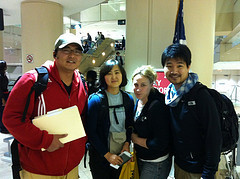 I was thirty seconds away from my apartment and texting that I was still alive when someone laughed and said: "I suppose I'd do the same thing if I just got into a car with a bunch of strangers who were taking me to Guatemala."
I was thirty seconds away from my apartment and texting that I was still alive when someone laughed and said: "I suppose I'd do the same thing if I just got into a car with a bunch of strangers who were taking me to Guatemala."
But first she had made her joke in Korean. Of my Good Neighbors USA traveling group, I am the only one who isn't Korean. (This will be useful to know later.)
Three things will forever remind me of my time in Guatemala: the smell of a burning fire, the sound of two hands clapping tortillas, and the sound of roosters.
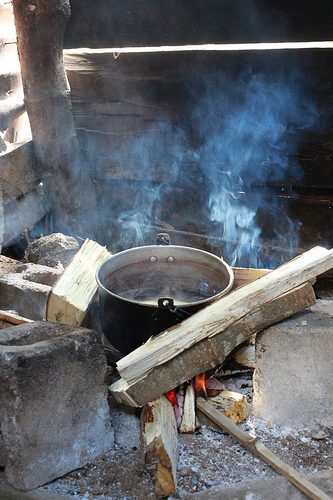 If you're new to this story, I recently went on a trip to Solola, Guatemala, to learn about Good Neighbors USA's newest project there -- Project Cookstove -- an initiative to replace the traditional "dirty stove" firewood method of cooking with new, safer, energy-efficient cookstoves. They will soon be kicking off a year-long fundraiser for sponsors, and I've been asked to help give their campaign some attention. (I've written about it previously here and here.)
If you're new to this story, I recently went on a trip to Solola, Guatemala, to learn about Good Neighbors USA's newest project there -- Project Cookstove -- an initiative to replace the traditional "dirty stove" firewood method of cooking with new, safer, energy-efficient cookstoves. They will soon be kicking off a year-long fundraiser for sponsors, and I've been asked to help give their campaign some attention. (I've written about it previously here and here.)
Rather than doing a day-by-day assessment of this trip, I'm going to break it down in the way that I will remember it – by the items I needed in my emergency supplies.
I have you guys to thank for this, as you were extremely helpful in telling me what I might need, what I will absolutely need, and what I might want to have on hand just in case the worst happens. On my trip to Target with Cat and Dana the day before I was to leave, there was a bit of teasing about some of the items I was purchasing. But as I look over this list of what I packed in my limited amount of allotted baggage, I have to say it's pretty impressive just how much of it came in handy.
Z-Pack / Cipro
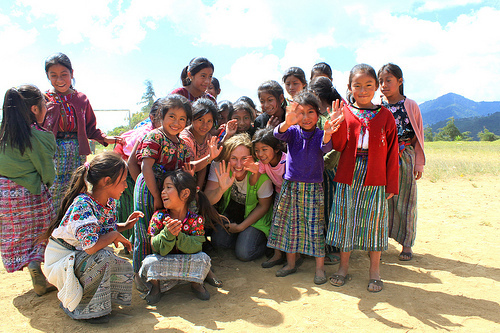 I'll start with that because it's the one I just finished using. About three days after I returned from the trip I got hit with a nasty cold or lung infection. It was either from being in the embrace of about fifty little girls who were sneezing/coughing/sniffling or it's from basically living inside of a house fire for five days.
I'll start with that because it's the one I just finished using. About three days after I returned from the trip I got hit with a nasty cold or lung infection. It was either from being in the embrace of about fifty little girls who were sneezing/coughing/sniffling or it's from basically living inside of a house fire for five days.
I'm going to be writing a bunch of stories here that are mostly about what it's like to travel with a bunch of strangers, but I do want to start with the real story, why Good Neighbors is there, replacing stoves, needing sponsors for Project Cookstove. We installed two cookstoves during our time there (each stove takes two days), and visited one family who'd had a cookstove for over a month. I remember this feeling I got when I walked outside of the house in San Paulo, after we'd installed one stove, where I looked over the rough, jagged streets at the hundreds of houses, each spewing a steady stream of firewood smoke, and was hit with that overwhelming feeling of not being able help everyone, that nobody can do this alone.
The air quality in Guatemala City is one thing, but being in the hills of Solola, where every structure contains an open fire, makes the air thick with soot and ash. Sometimes we were inside these structures for thirty minutes or more, to film or shoot pictures, and it's difficult to see, nearly impossible to breathe. Within just a couple of minutes my face hurt from the heat, my eyes were burning, my lungs were spasming. This is where people live. This is where children sleep, every night.
I would get a headache minutes after exposure, right between my eyebrows. By the third day the headache would come back just as soon as I smelled burning firewood, a sense memory ache caused by merely entering the town. At night we were all coughing, blowing our noses. Black gunk would run out of us. We were so busy working, gathering footage, interviewing people, it was easy to forget that we were spending our days inhaling smoke and ash. By the Thursday we were all waking up sore and ill.
My backpack of medical supplies came in handy, pretty much constantly. By the third day Bryan joked, "Your backpack. It has first aid. And second aid. Third aid, fourth aid…"
Benadryl / Sleeping Mask
The first thing I used from my backpack, so that I could sleep through the red-eye to Guatemala City. I was soon passing capsules to my travel companions, which is what kicked off my backpack as a common conversation topic. Joking about what could possibly be inside my magical backpack started as good small talk for four people who were essentially strangers (and only speaking English to be kind to this girl who doesn't know a word of Korean), but by the end of the trip, it seemed there wasn't anything my backpack couldn't fix. (You'll see.)
Sewing Kit (part one)
Flying with me were Good Neighbors Manager Bryan, Videographer Robin, and Photographer Jeff. Before the plane took off, Jeff showed us how he'd already somehow ripped his shorts. "I have a sewing kit," I said. "I could fix that for you." He thanked me and said he'd probably be okay, but added, "Who brings a sewing kit?"
"You have a sewing kit?" Bryan asked. "With you here?"
"Not in my backpack, but in my suitcase."
"Why would you bring that?"
"In case. I don't know."
"Is it for skin? Like a gash or wound?"
"I hope not."
This is a good place to give you my quick impression of anyone we met once we were in Guatemala:
"Hi. My name is so-and-so and it's really nice to meet you. This scar you see on my neck is from when I was kidnapped and forced at knifepoint to give up all of my belongings and I almost died. …. [THEN, WITH A HUGE, WELCOMING WAVE OF THE ARM] So, anyway, this is Solola! It is beautiful here, as you can see."
Everyone. Everyone had a story, and not just the Guatemalans. The people I was traveling with, their stories often began, "Well, in Haiti…" or "When I was in Afghanistan…" and then it's stories of bank heists or intentional car accidents for robberies or kidnappings or – no lie – "When he was in Chad a bug bit him or stung him and now every six weeks he has to drain it at the hospital because nobody knows what it is other than possibly a parasite."
Even when I tried to compete, with my whole "I almost got robbed in Prague on my birthday" story, it was quickly trumped, although not in a snotty "That's nothing!" one-upmanship sort of way. You guys, I was traveling with the nicest people on the planet, each one somehow nicer than the next, so polite and honest, that even swapping terrible stories began with manners.
"That is so scary, Pam," she said when I finished my story. "Something almost like that happened to me once" and then her story had a loaded gun and people screaming and running for their lives and theft and fainting on the streets and it was SO NOT LIKE my story at all, which involved a box cutter and nothing getting stolen from me in the slightest. But as soon as she was finished saying some words like, "he held the gun to my ribs" or "I should be dead" she turned toward the car window, broke into a huge grin and said, "And here we are in Antiqua! It is beautiful here, as you can see…"
(For Part Two, continue here. For the full round-up, see here.)
the latest from pamie.com
- Pamela Ribon's profile
- 446 followers


